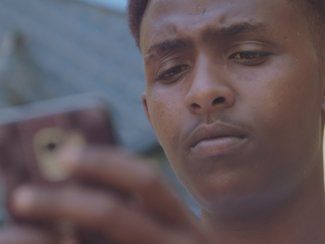Liban Mohamed is a young man who grew up in Borama, Somalia. He was planning for his future, to get an education and a job, when one day he started to get pictures and messages from a friend who had gone to Europe. Suddenly Liban felt confused. His dreams of an education and a job faded away. He too wanted to go to Europe. Liban contacted a smuggler who arranged for him to travel to Europe via Yemen, Sudan. Ethiopia, and Libya. He was totally unprepared for all the difficulties and dangers he was going to meet.
“I didn’t have any idea about smugglers or the difficulties. No one gave me proper information. I thought the trip would be easy. I didn’t imagine it would be as I saw it in reality or something even close. It was far from what everyone had told me.”
He left for Yemen where he was taken to a small village at the Red Sea coast to wait for enough passengers for the boat trip to Sudan. He had to stay there for a month. The war was raging around them and they could hear artillery and aerial bombings just a few kilometres away on the other side of the mountains. They crossed to Sudan without incident but when they arrived Liban had another shock. The new smugglers that received them were brutal and violent. After nine days of driving non-stop through the desert they were attacked by bandits who kidnapped the passengers and sold them to traffickers in Libya. There Liban and the others were ordered to call their families for money. They were beaten and tortured to force their families to send money quickly.
“There was a room next to ours called ‘hell’ or ‘death room’. When they took us there they hang us from the roof and tortured us with electric shocks and burning plastic.”
After having paid they started the final leg of the journey, to the coast. The driver was drunk and in the middle of the desert the car flipped over. Some passengers died, others were badly injured. Liban had to help fixing the car even though he had injured his shoulders. When they had fixed the car, the passengers were beaten by the traffickers before they continued the trip.
Finally they reached the coast and Liban boarded a boat. Four days out at sea they ran out of petrol. They were spotted by an airplane and a Libyan ship came to the rescue. Back in Libya, Liban was put into a detention centre from where he was evacuated when fighting broke out in the area. He says this experience was even worse than what he had suffered at the hands of the traffickers and he was relieved when he was offered the opportunity to repatriate.
“I’m happy to be back in my country. I’m also happy I’m part of this awareness campaign in my country, especially against false dreams. I know that someone who hasn’t travelled has no experience but there’s nothing there except torture, death, and difficulties.”

